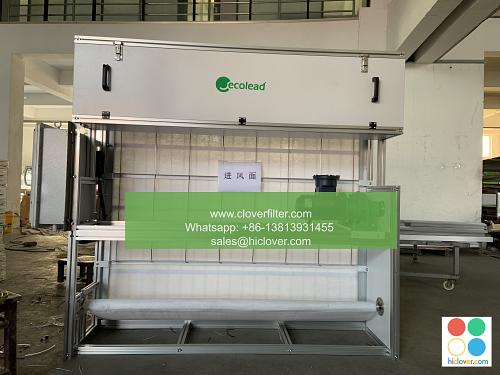Automatic Roll Air Filter Selection: Factors to Consider for Quebec Pharmaceutical Plants

Quebec pharmaceutical plants require precise control over their environment to ensure the quality and safety of their products. One crucial aspect of this control is the air filtration system, which must be capable of removing contaminants and particles from the air to prevent contamination and ensure compliance with regulatory standards. Automatic roll air filters are a popular choice for these facilities due to their high efficiency, low maintenance, and cost-effectiveness. However, selecting the right automatic roll air filter for a Quebec pharmaceutical plant can be a complex task, involving several factors that must be carefully considered.
One of the primary factors to consider when selecting an automatic roll air filter is the type of contaminants present in the air. Pharmaceutical plants often handle hazardous materials, such as chemicals and biological agents, which can release particles and vapors into the air. The filter must be capable of capturing these contaminants, which may require a filter with a high efficiency rating, such as a HEPA (High Efficiency Particulate Air) filter. Additionally, the filter must be designed to handle the specific types of contaminants present, such as dust, mist, or fumes.
Another important factor to consider is the airflow rate and volume of the facility. The filter must be able to handle the required airflow rate, which is typically measured in cubic feet per minute (CFM). A filter that is too small may not be able to keep up with the airflow demands of the facility, leading to decreased efficiency and increased pressure drop. On the other hand, a filter that is too large may be unnecessary and wasteful. The filter must also be designed to handle the specific air volume of the facility, taking into account factors such as room size, occupancy, and ventilation rates.
The operating conditions of the facility are also critical when selecting an automatic roll air filter. Pharmaceutical plants often operate at precise temperature and humidity levels, which can affect the performance and lifespan of the filter. The filter must be designed to operate within the specific temperature and humidity ranges of the facility, and must be able to withstand any extreme conditions that may occur. Additionally, the filter must be compatible with any cleaning or disinfection protocols used in the facility.
Regulatory compliance is another key factor to consider when selecting an automatic roll air filter for a Quebec pharmaceutical plant. The plant must comply with relevant regulations and standards, such as those set by Health Canada and the FDA. The filter must meet or exceed these standards, which may include requirements for filter efficiency, airflow rate, and pressure drop. The filter must also be designed and constructed to meet the specific requirements of the facility, such as ISO 14644-1 or cGMP.
In addition to these technical factors, there are also practical considerations that must be taken into account when selecting an automatic roll air filter. The filter must be easy to install, maintain, and replace, with minimal disruption to the facility’s operations. The filter must also be cost-effective, with a reasonable upfront cost and ongoing maintenance expenses. Finally, the filter must be backed by a reputable manufacturer with a track record of quality and reliability.
When evaluating different automatic roll air filter options, it is essential to consider the total cost of ownership, including the upfront cost, maintenance expenses, and energy costs. The filter must also be evaluated based on its performance, including its efficiency, airflow rate, and pressure drop. Additionally, the filter must be compatible with the facility’s existing HVAC system and must be designed to integrate seamlessly with other air filtration systems.
Overall, selecting the right automatic roll air filter for a Quebec pharmaceutical plant requires careful consideration of several factors, including contaminant type, airflow rate and volume, operating conditions, regulatory compliance, and practical considerations. By taking the time to evaluate these factors and selecting a filter that meets the specific needs of the facility, pharmaceutical plants can ensure a safe and healthy environment for their products and personnel.
Conclusion
In conclusion, the selection of an automatic roll air filter for a Quebec pharmaceutical plant is a critical decision that requires careful consideration of several factors. By understanding the key factors involved and evaluating different filter options based on these factors, pharmaceutical plants can ensure the quality and safety of their products and comply with relevant regulations and standards. Whether you are designing a new facility or upgrading an existing one, the right automatic roll air filter can play a critical role in maintaining a safe and healthy environment.
FAQs
Q: What is the difference between a HEPA filter and a standard air filter?
A: A HEPA filter is designed to capture 99.97% of particles as small as 0.3 microns, making it ideal for pharmaceutical plants that require high levels of air purity. A standard air filter, on the other hand, may only capture 80-90% of particles, making it less suitable for these facilities.
Q: How often should I replace my automatic roll air filter?
A: The replacement frequency of your automatic roll air filter will depend on several factors, including the type of filter, airflow rate, and operating conditions. As a general rule, filters should be replaced every 1-3 years, or as recommended by the manufacturer.
Q: Can I use an automatic roll air filter in a facility with high humidity levels?
A: Yes, but the filter must be designed to operate in high humidity environments. Look for filters that are specifically designed for use in humid conditions, and follow the manufacturer’s recommendations for installation and maintenance.
Q: How do I know if my automatic roll air filter is compliant with regulatory standards?
A: Check the filter’s specifications and documentation to ensure that it meets or exceeds the relevant regulatory standards, such as those set by Health Canada and the FDA. You can also contact the manufacturer or a regulatory expert for guidance.

